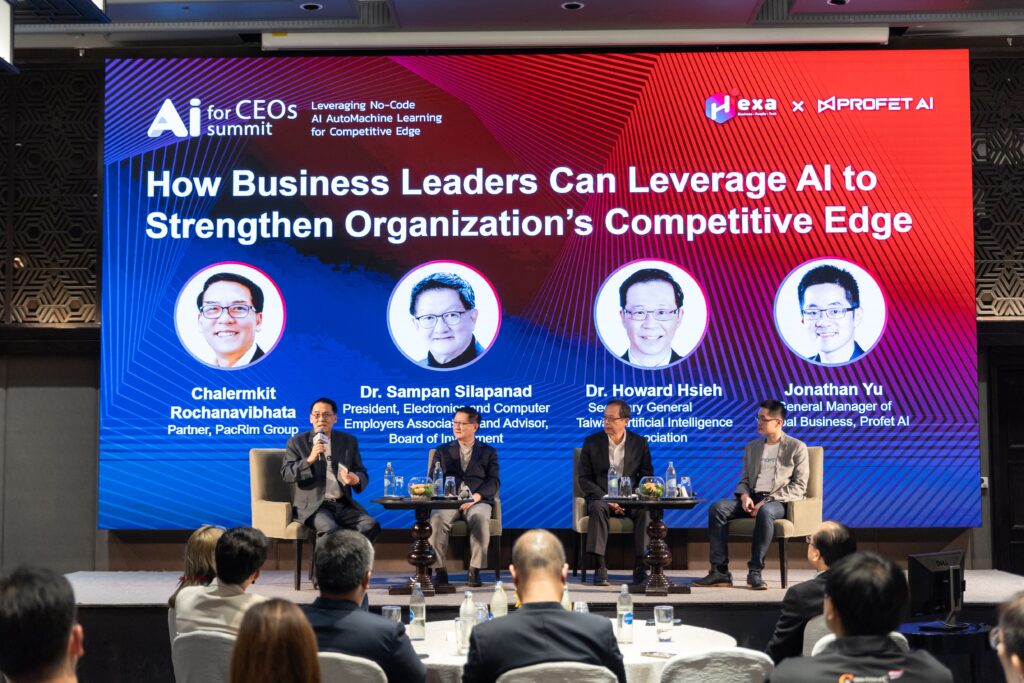8 Ways that Taiwan Manufacturers are Using AI to Navigate Economic and Geopolitical Uncertainty

Geopolitical chaos and a looming economic downturn are a growing concerns for manufacturers, given their complex and global operations. Recent threats faced to supply chains, include inflation, trade disputes, war, pandemics, and energy access. A push for rapid decoupling also creates serious headaches for decision-makers.
Taiwan: The Epicenter of Both Geopolitical Uncertainty and AI Technology
In the face of these challenges, manufacturers in Taiwan are turning to AI to navigate this increasingly complex global economic landscape. Recently, a four-part summit titled Crossover Talks, organized by manufacturing AI solution provider, Profet AI, brought together industry, academia, and technology experts to discuss the opportunities, challenges, and best practices for manufacturers to implement AI and digital transformation in a challenging economic climate.
Taiwan has some of the most advanced manufacturers in the world and is obviously at the forefront of some of the most worrying geopolitical tensions. It is also at the cutting edge of the technologies that will power the AI revolution, such as semiconductors, which makes it the ideal location for this discussion.
Keynote speakers included experts from AUO, Innolux,Gogoro, Cheng Shin Rubber, Kuan Yuan Paper, Asia Giant Engineering, De Licacy Industrial, Taiwan AI Academy, National Cheng Kung University, National Taiwan University, and Feng Chia University.
8 Takeaways
Profet AI has diluted the four events and hours of discussion into eight key takeaways:
- Successful Digital Transformation Requires the Marriage of Data Science and Domain Knowledge
Data science teams in enterprises need to work in conjunction with departments and colleagues with vertical domain knowledge. Profet AI preaches that successful digital transformation relies on the use of the correct data combined with domain knowledge in order to generate the actionable intelligence that can drive decisions.
- Prioritize Cross-Department Conversation
For an enterprise to successfully carry out digital transformation, it needs the support of management and effective dialogue and cooperation between departments.
- Foster a Habit of Data Collection
For traditional companies to become more data-driven, they need to first start analyzing their existing data and also foster a culture of data collection. Stakeholders need to believe in the power of data to engender change, and there also needs to be an investment in the correct AI tools.
- Focus on First Using AI to Solve Key Problems, Not Changing the Whole Company
Companies should avoid seeing AI as a panacea to turn the company around. Instead, they should prioritize specific processes that need to be optimized.
- Use AI to Replicate the Knowledge of ‘Old Masters’
Traditional manufacturers often over-rely on the wisdom of senior staff, which makes them vulnerable when processes need to be replicated or there needs to be a handover of know-how if they retire. Data-driven companies can utilize AI to create a framework for both personnel succession and the handover of knowledge.
- Let Data Enhance Personnel Management
Participants at the summit complained in recent years, being blighted by worker shortages. Companies can utilize AI to highlight the characteristics of workers that have resigned and which present workers have a high probability of leaving, then reach out to them in advance to see if there is any way to help them.
- Manufacturers Need to Recruit and Cultivate AI Talent
For digital transformation to be successful, manufacturers need to change their internal culture and also cultivate their own AI talent. Over the last five years, AUO has trained more than 1,000 AI engineers in a joint initiative with the Taiwan Artificial Intelligence Association (AIA).
- Everything Begins with Company-Wide Mindset Change
Director of AIA, Benjamin Kuo, believes that as well as fostering AI talent, there needs to be a mindset change in top management so that the company will become a data-driven organization. Only once the company has both the AI mindset and talent can they really lay the blueprint for digital transformation. Leaders need to ensure that AI is embedded into the DNA of their organizations.

